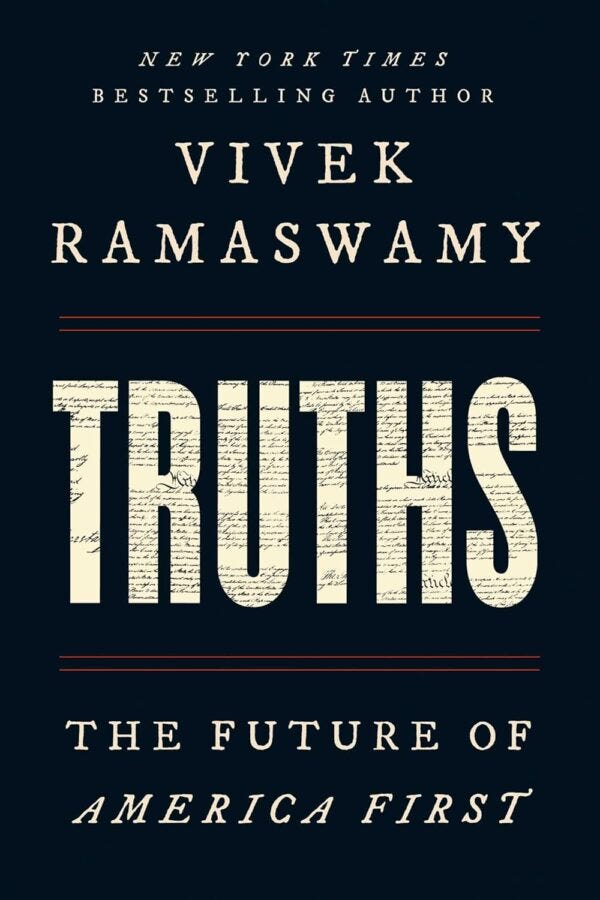Truths: The Future of America First by Vivek Ramaswamy
Vivek Ramaswamy's "Truths: The Future of America First" emerges as a clarion call for the conservative movement in America, aiming to redefine and rejuvenate the Republican Party's vision. Ramaswamy, a first-generation American, entrepreneur, and former presidential candidate, uses this book to articulate what he believes are the foundational truths necessary for America's survival and prosperity.
Core Themes and Truths:
The Existence of God: Ramaswamy boldly begins with the assertion that "God is real," setting a tone of unapologetic conservatism. This theme underscores a moral foundation that he believes is crucial for societal health.
Gender Identity: He staunchly defends traditional gender roles, stating, "There are two genders," challenging contemporary gender ideology movements.
Energy and Environment: Ramaswamy argues for the continued use of fossil fuels, asserting that "Human flourishing requires fossil fuels," which directly confronts the green energy narratives prevalent today.
Racism and Equality: He criticizes what he terms "reverse racism," stating, "Reverse racism is racism," advocating for true equality over policies aimed at reparation or discrimination in reverse.
Immigration and Borders: A firm stance on national sovereignty is taken with, "An open border is no border," emphasizing the importance of border control for national security and identity.
Education and Parenting: Ramaswamy champions parental rights over educational content, with "Parents determine the education of their children," opposing state or federal overreach in educational curriculums.
Family Structure: He elevates the nuclear family as the "greatest form of governance known to mankind," highlighting its role in stability and moral upbringing.
Philosophical and Political Insights:
Ramaswamy's book is not just a list of beliefs but a philosophical treatise on what it means to be an American. He critiques the modern Republican Party for its failure to provide a coherent, positive vision, warning of electoral failures without a return to fundamental truths. His approach is to engage with these issues head-on, advocating for a return to the principles that he believes made America great:
Honesty Over Political Correctness: Ramaswamy's writing style is direct, reflecting his belief in the power of truth over political expediency. He calls out what he sees as lies or falsehoods perpetuated by both political adversaries and sometimes within his own party.
The Role of Capitalism: He defends capitalism not just as an economic system but as a moral one that uplifts from poverty, contrasting this with what he perceives as socialist tendencies in modern policy-making.
Reception and Reviews
The book has stirred significant discussion and critique:
Positive Feedback: One reviewer on Amazon praised, "Vivek is a guiding light... reignites our love for this country the United States of America." This reflects admiration for Ramaswamy's unapologetic stance and his ability to connect with readers yearning for a reaffirmation of traditional values.
Criticism: Conversely, there's been sharp criticism, with one review labeling it as "Totally incoherent argument for fascism and the ending of our Democracy," indicating the deeply divisive reception where some see his truths as threats to modern democratic values.
Quotes by Vivek Ramaswamy:
"Today’s conservatives know what they’re against. They’re anti-woke, anti-globalist, anti-big government. But what exactly do they stand for? The fact that this is a hard question to answer is a damning indictment of the modern Republican Party which has abjectly failed to articulate an affirmative alternative to the left’s vision."
"Conservatives need a clear vision for the Republican party this election season if we don’t want a repeat of the abysmal results at the ballot box in 2018, 2020, 2022, and 2023."
Conclusion
"Truths" by Vivek Ramaswamy is more than just a political manifesto; it's an attempt to redefine the narrative of conservative America. Through his bold assertions and direct confrontation of contentious issues, Ramaswamy has crafted a book that, while divisive, seeks to ignite a conversation on what America stands for in the 21st century. His call for a return to foundational truths is both a critique of current political landscapes and a vision for what he believes could be a stronger, unified America.
Whether one agrees with his truths or not, Ramaswamy's book is a significant contribution to the ongoing dialogue about America's future direction.









